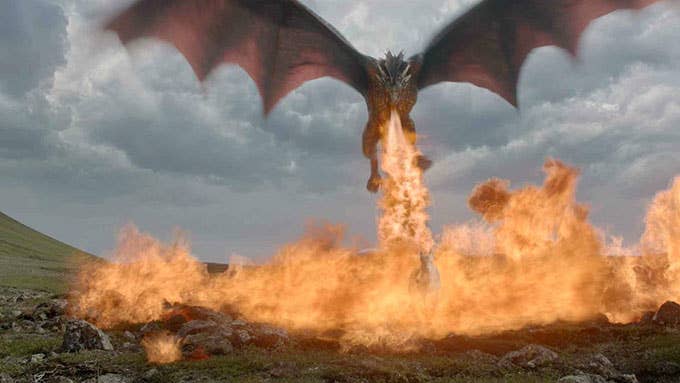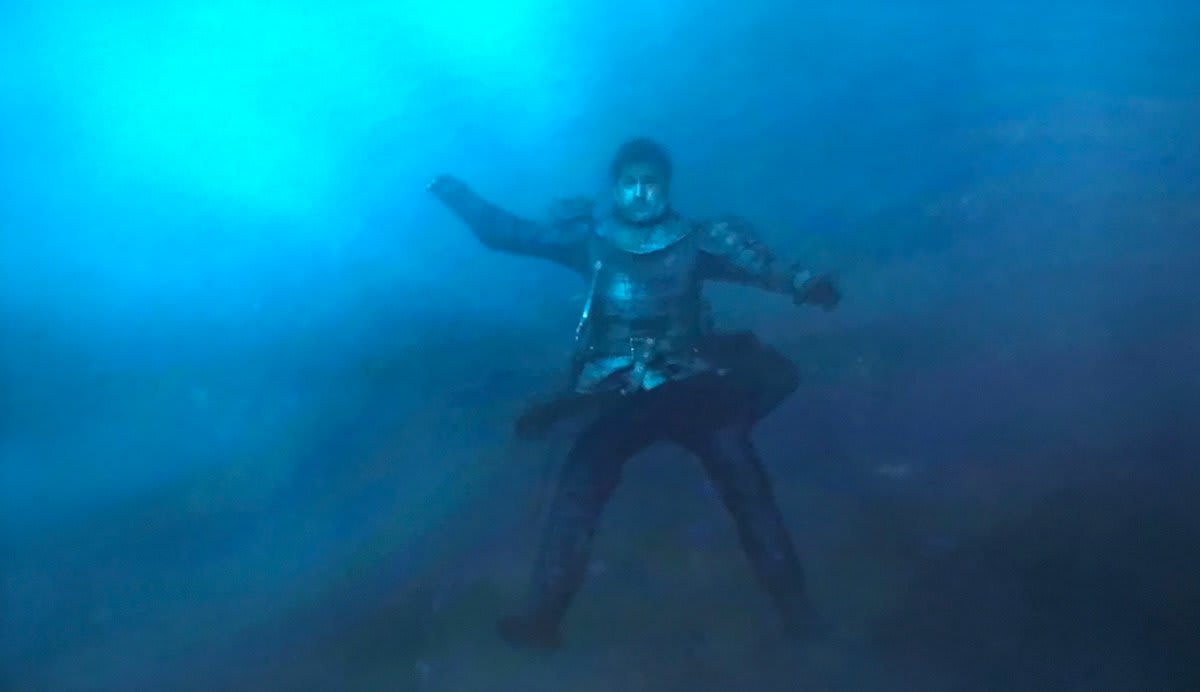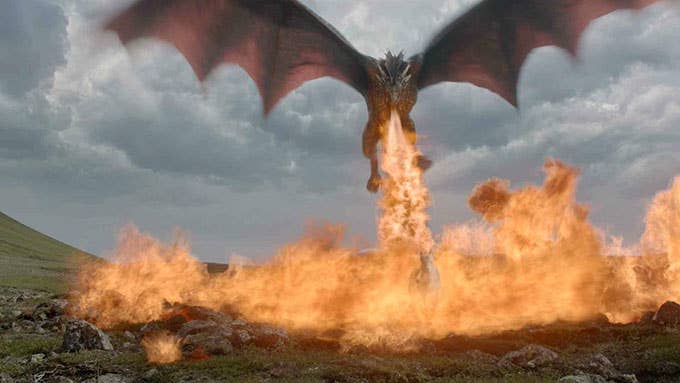
It's hard for anyone to come to a consensus when the topic is Game of Thrones, mostly because the show has a massive fanbase comprised of wildly different factions. There are the book readers, who are happy to beat you over the head with everything they know that you don't; the average fan, your buddy at the office who delays the start of their Monday by gabbing about it at the water cooler; and the casual fans, who are mostly just excited to see some fucking dragons tear it up.
That dynamic is part of what makes it hard to peg the best anything on the show. But at the very least, this past Sunday night's episode, "The Spoils of War," deserves serious consideration for the honor of best episode ever. Regardless of what you're in it for—family bonds, high-stakes battles, death and destruction, or even just surprise twists—the fourth episode of the seventh season had everything you could possibly ask for.
So yeah, I'm going to go there: "The Spoils of War" may be the best Game of Thrones episode we've seen yet, and I'm going to tell you why.
WARNING: The following write-up will contain spoilers about the latest episode of Game of Thrones, in addition to call-backs from the show's history. Continue at your own risk.
It gave Arya her triumphant return to Winterfell
Assumed dead by the majority of her family, Arya Stark's winding journey toward her home finally reached its end last night. And while the teary reunion between Arya and her sister, Sansa, was the most emotional moment, it was Arya's brief duel with Lady Brienne that means the most within the Game of Thrones canon.
Way back in the show's first season, Arya openly rejected the more "womanly" duties she was forced to learn as a child, looking on with envy as she sewed while her brothers practiced archery and swordplay. At one point, she was fortunate enough to receive the gift of a sword from her half-brother Jon Snow, which she jokingly named "Needle" to poke fun at what she'd been forced to learn.
Now, after years of travel and lessons from an assortment of badasses and teachers, Arya is the warrior she always believed she could be. Brienne has a massive size and experience advantage over Arya, but with her agility and knowledge gained over time, Arya goes blow-for-blow with one of the best duelists in Game of Thrones.
Brienne and Arya sparring. This is everything. #GameOfThrones pic.twitter.com/U7DW2RruUb
That this is the Arya we see after she finally made it back to Winterfell is no accident; it is a fulfillment of the dreams she had when she left in the first place, and a damn satisfying payoff for longtime viewers.
It showed Westeros the true power of dragons
Game of Thrones already showed us Khaleesi's dragons were a force to be reckoned with in earlier episodes of the show. They shifted the odds dramatically during a famous battle in Slaver's Bay, and ultimately served as a trump card whenever things were getting hairy for Emilia Clarke's character.
But their use in "The Spoils of War" was different, because it marked the return of dragons to Westeros battlefields. There was no preparing for this if you were a member of the Lannister army; people can tell stories about how dangerous these creatures are, but until you watch them come over the horizon and melt hundreds of your comrades simultaneously, it's hard to put their might in proper perspective.
#GameOfThrones
This is why we watch ❤
Love the sound of the dragons right before they start fire ❤ GOOSEBUMPS 😍😍😍 pic.twitter.com/ikf5lNndCF
To be clear, this was about a lot more than just the destruction of people we see on screen. In the process of killing what could be thousands of Lannister men, Drogon burned down an unfathomable sum of supplies in the army's possession. These were supposed to be big chips in the Lannister stack, allowing them to simply outlast Daenerys and her allies, who are fighting on foreign soil. In one fell swoop, Drogon kicked in the door, burned down the grain reserves, and destroyed the counter-weapon meant to end his life.
Drogon did not make it out unscathed, but his parade of destruction let all of Westeros know what time it is.
It was short and to the point
This might be an unpopular opinion, but the runtime for "The Spoils of War" felt perfect. It was on the shorter end of the spectrum—especially compared to some of the movie-length episodes we're expected to get in the future—but this served to make it feel tighter, and ultimately more effective at getting important messages across.
One of the big accusations levied at Game of Thrones is that it can sometimes spend too much time setting things up. It's a big, sprawling universe, with dozens of characters and locations to introduce, which can make it feel as though HBO's showrunners have to pack a lot of fluff into a given episode, just to make sure all the important story threads weave into a coherent picture.
Aided by the show's concentrated focus on the end game, "The Spoils of War" clocked in at just over 46 minutes from the opening scene to the dramatic ending. This abridged episode didn't do a whole lot of jumping around, instead focusing long sequences on individual areas and relationships in Westeros.
By going this route, "The Spoils of War" closed with an out-and-out battle sequence that ranks up there with the very best action sequences in the show's history, all without being interrupted by cutaways or transitions to other key figures. I'm not one to turn down more Game of Thrones if it's offered, but I thought "The Spoils of War" did an excellent job getting to the point(s) without losing anything that makes the show great.
It reflected the core message of the show
If you've learned anything from six-plus seasons of Game of Thrones, it should be that there are very few traditional bad guys, and the moral compass of the show is always shifting. Look at the case of Stannis Baratheon: he was viewed by thousands of men as a good man and true heir to the Iron Throne, but his lust for power led him down dark paths, leading to him ritualistically sacrificing his own daughter.
Many view the Lannister family as humanity's nominal bad guys, and it's a reputation not entirely undeserved. There are plenty of fans ready to celebrate every time they look like they're down and out.
LANNISTERS BLEW A 3-1 LEAD IM CRYING
Me watching Daenerys, Drogon, and the Dothraki torch the Lannisters. #GamesOfThrones #DemThrones pic.twitter.com/l4Rggv2okS
Me when Lannisters die: No emotion.
Me when dragons or horses get hurt: pic.twitter.com/pxfH5ZbPMx
But their role in the show is much more important than that, and "The Spoils of War" ended with the Lannisters broken, left with few ways out of this jam.
I would argue the Lannister family's story is perhaps the most important to the show's overarching theme, because they have shown over time that bravery, fairness, and good intentions are not what keep families and legacies alive. They have outlasted rivals because they move in silence, anticipating moves and counter-moves from their opponents, knowing that just one mistake could lead to their ruin.
And even still, the Lannister army was decimated in "The Spoils of War," caught off guard by an enemy (Dothraki) and a superweapon (a goddamn dragon) they were unprepared to face. Well-planned victories and alliances—with a dash of Cersei brutality—had them on top coming into the episode, and it all meant nothing when Drogon started burning their soldiers to a crisp. Things fell apart for Game of Thrones' most enduring family because of a single, sudden surprise, and at its core, that is the message of the show: never sleep, because sleep is the cousin of death.
It showed us Daenerys might be just like everyone else
If the Lannisters are the show's pulse and sort-of bad guys, then Khaleesi is the hero for many fans. After freeing slaves, empowering her people, and promising a different sort of rule to her subjects, it's not hard to see why she has her devoted following.
But with her back against the wall and allies suffering heavy losses, Daenerys went with the nuclear option, busting out one of her dragons in a show of force. It's hard to argue against it as a power move—the episode ended with the Lannister army in complete disarray—though it does call into question her credentials as some sort of special leader.
Watching Daenerys abandon her earlier plans, the viewer is forced to reconcile with broader questions about the show's morality. Are the people involved in the Game of Thrones power struggle actually good or bad, or does the battle for power force otherwise decent people to do horrible things, all to assert their spot at the top of the pyramid?
It seems fairly clear now, if it wasn't before, that the answer is the latter. Compared to some of her contemporaries, Daenerys certainly has a stronger track record as a voice and advocate for people of all sorts. But when push came to shove and she was forced to decide how much power meant to her, she tossed aside her best intentions and turned the battlefield into a human barbeque.
It left us with a question to ponder heading into the next episode
Unless your name is Jon Snow, Game of Thrones is pretty obsessive about the idea of finality. Deaths are shown in their full, excruciating detail, even if it means you have to watch someone's head explode after being crushed by The Mountain.
But "The Spoils of War" represented a paradigm shift for Game of Thrones, with the fate of one of the series' iconic characters hanging in the balance when the show faded to black. After a misguided attempt to strike down the opposing leader, Jamie Lannister is seen floating to the bottom of a large body of water, seemingly unable to pull himself back to the surface.

Maybe that's it for him, and in fairness, an unceremonious death might bring things full circle for his character, since he's most famous for betraying and murdering the king he was sworn to protect (even if it was justified). But in a show where death is usually spelled out with blood and guts, it feels like there's still more to come here.
This gives us a huge question to answer heading into the next episode, and that in itself is a gift.

